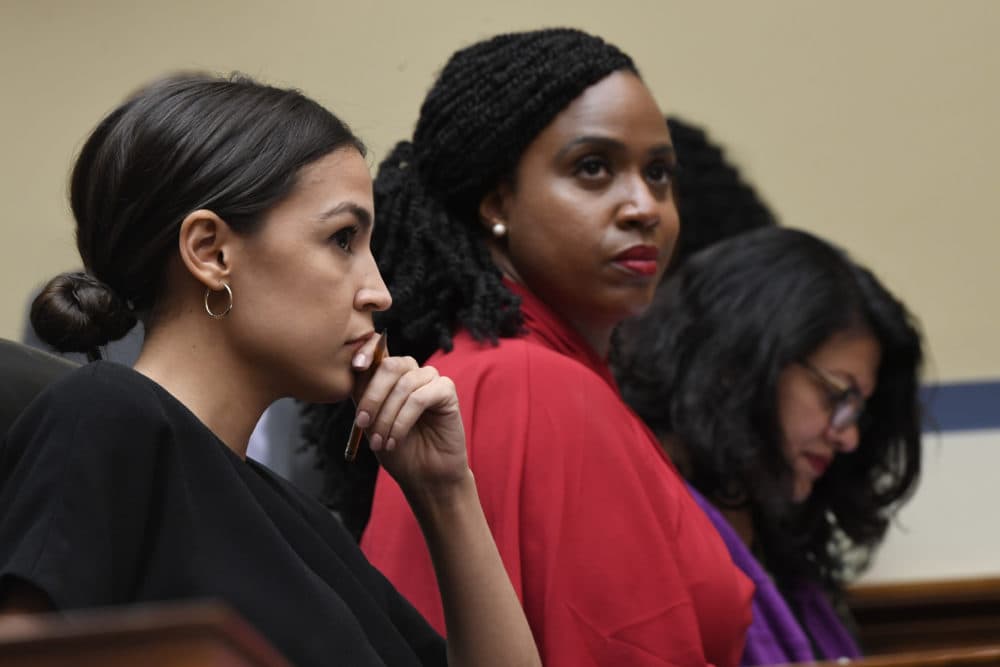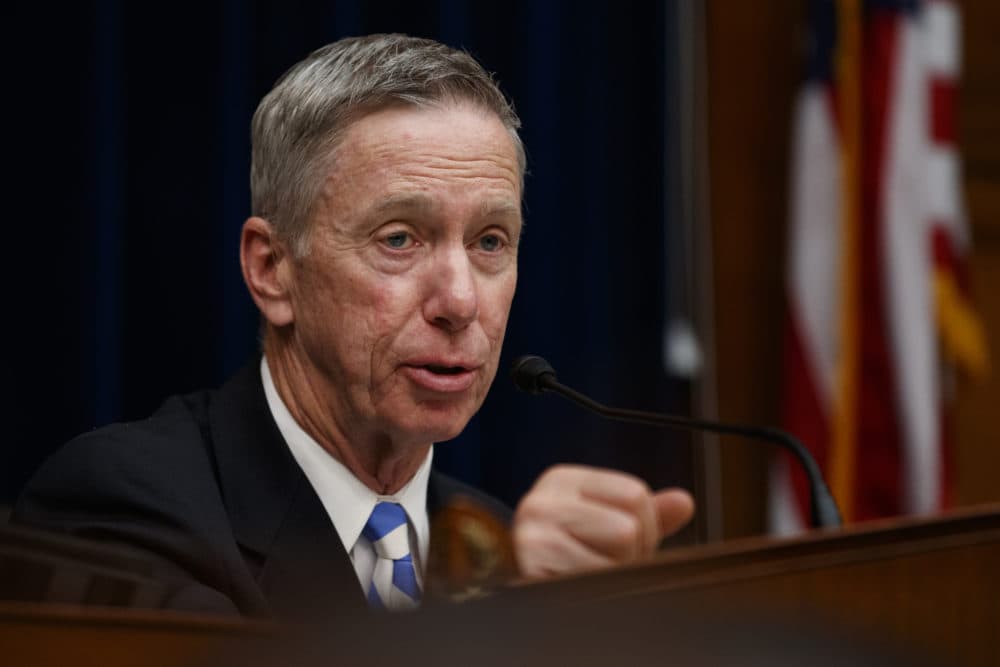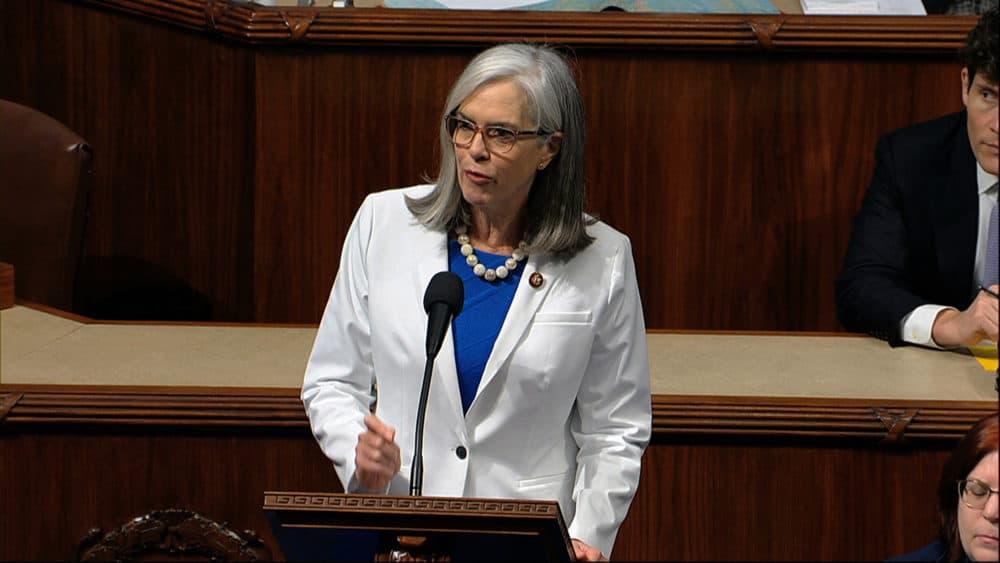Advertisement
Where Does The Democratic Party Go From Here? Mass. Delegation Weighs In

In less than two weeks, Democrats and Republicans will convene on Capitol Hill for the first day of the 117th Congress.
While Democrats will hold onto a slim majority in the House, the sting of losing seats to Republicans in what was expected to be a banner year lingers, with plenty of finger-pointing among moderates and progressives over where to place the blame.
These losses have also exacerbated an ongoing intra-party struggle over Democratic messaging and direction — divisions that endure even within the entirely Democratic congressional delegation in liberal Massachusetts.
“This is a time for recovery, and I believe reconstruction," said Rep. Ayanna Pressley, of Dorchester, last month in the wake of the election. “We cannot return to that status-quo normal, because it was insufficient, unjust and inadequate to begin with.”
The Progressive Push

Pressley, who won a second term in the House in November, is part of the so-called “Squad," a group of young lawmakers — including Alexandria Ocasio-Cortez of New York — who've drawn widespread ire from Republicans over their rhetoric and calls for action on issues like police reform, Medicare for All and the Green New Deal.
When discussing her rhetoric and policy proposals, Pressley prefers the term "bold" to the increasingly polarizing P word.
“What is the point of having a Congress that is the first pro-choice majority Congress in the history of Congress; that is the most diverse representative body in the history of Congress; that has an unprecedented number of women serving, if we don’t legislate like it?"
“We cannot return to that status-quo normal, because it was insufficient, unjust and inadequate to begin with.”
Rep. Ayanna Pressley
But Democrats in moderate and conservative districts argue the Squad's rhetoric is alienating their constituents — and helped contribute to last month's losses.
“If we don’t mean we should defund the police, then we shouldn’t say that," said Rep. Abigail Spanberger, of Virginia, on a leaked phone call with House Democrats in the days after the November election. “And we need to not ever use the word socialist or socialism ever again. Because while people think it doesn’t matter, it does matter. And we lost good members because of that.”
Spanberger nearly lost her own reelection race to a Republican in her purple-leaning central Virginia district.
Another lawmaker from Boston shares Spanberger's worry:
“Sometimes there’s this drive for purity, especially within the progressive elements of our party," said Rep. Stephen Lynch. "They fail to recognize that there are a lot of moderate seats out there. ... For Democrats, we have a really big tent. And that’s our strength but that can also be our weakness when we don’t recognize that some messages that we put out there are toxic in some districts."
Advertisement
Lynch grew up in a housing project in South Boston, later worked as an ironworker, and has served in the House since 2001.

A stalwart on progressive social issues, Lynch says he's a staunch ally in the fight for racial equality, gender parity and LGBTQ rights. But he's concerned about the progressive push for universal health care, which could abolish private health insurance for more than 50 million Americans.
"That’s not a winning message and there might be a better way for us to accomplish what people want without adopting that particular program," he said. "Someone shouldn’t be bludgeoned because they don’t sign up for that particular program."
Lynch favors President-elect Joe Biden's approach: continuing private health insurance, while expanding Obamacare's public option.
"For Democrats, we have a really big tent. And that’s our strength but that can also be our weakness when we don’t recognize that some messages that we put out there are toxic in some districts."
Rep. Stephen Lynch
House Democratic leadership says that despite the party's differences, the caucus is increasingly unified in the face of the ongoing coronavirus pandemic and President Donald Trump's attempts to upend our democratic systems and institutions.
“We are unified," said Rep. Katherine Clark, of Melrose, who is the newly elected assistant speaker of the House.
Perhaps no one in the Massachusetts delegation knows more about the Democratic agenda than Clark. She says the first order of business in 2021 is more pandemic relief, followed by pushes to expand healthcare, childcare and so on.
"Our focus is going to be on those kitchen table issues and bringing those to our caucus and governing.”

Beyond Capitol Hill, Democrats may also be struggling to keep their diverse "big tent" voting base together. An analysis of exit polling data from the Brookings Institution suggests that in 2020, Joe Biden won Black and Latino voters by the lowest margin since 2004, and Asian voters by the lowest margin since 2008.
Losing The Working Class
Moreover, working-class white voters who used to vote Democrat and switched over to Donald Trump in 2016, largely stuck with Trump in 2020.
Outgoing Congressman Joe Kennedy III worries some Democrats have fallen out of touch with the working class.
“We have to do a bit of a better job of understanding that lived experience of people that take a shower after work — not just take a shower before," Kennedy said. "And I think there's more there that we can do."
Kennedy invites Democrats to remember that many Americans are in the midst of a "massively quick transition" away from the pastoral life their parents and grandparents knew, and that these voters often feel misunderstood and forgotten.
"I think a Democratic Party can still be a party of progress," Kennedy said. "It can still be a party that does not fear the future — that embraces it. But that also recognizes that we’re gonna be better positioned to fight for that future with those folks fighting with us, rather than leaving them behind."

UMass Boston Political Science Professor Paul Watanabe explains it this way: Republicans, he says, have done a better job than Democrats at recognizing that white working class people feel their status is threatened by the growing non-white populations in the United States.
“And that’s a challenge for the Democrats," Watanabe said. "To try to say that the fact that we have a more diverse country does not have to be one that works against your particular interests" as white, working class people.
Will There Be One-Party Control?
Back on Capitol Hill, Democrats face more immediate challenges. Even with a majority in the House and Biden sitting in the Oval Office, advancing any agenda may prove impossible should Republicans retain control of the Senate in 2021.
Control of the Senate will be determined by two very tight runoff elections scheduled for early January in Georgia.
Whatever the outcome, Watanabe sees no reason for progressive Democrats to ratchet back their policy goals.
“The Trump administration was able to push a very clear, far right agenda, and gain success in it," he said. "And it’s unreasonable, I think, for the Democrats to simply say you cannot push a strong agenda from one particular wing or the other."
"All we can do is do our best to put those issues in front of them. If the Republicans don’t want to do that, it is going to be on them."
Rep. Katherine Clark
Should Democrats take the Senate in January — and thereby attain majorities in both chambers of Congress in addition to a friendly face in the Oval Office — Watanabe says their strategy should be no holds barred.
“Obama faced that in his first term — the ability to have all that in control — but was going to wait until he got some sort of huge, national consensus before he acted," Watanabe said. "Well, in a polarized world we’re not going to get a national consensus so you gotta act when the fire is hot."
Should Republicans retain control of the upper chamber in 2021, newly-minted assistant House speaker Clark says she hopes the GOP is more willing to consider bipartisanship than it has been during the past decade.
“All we can do is do our best to put those issues in front of them," Clark said. "If the Republicans don’t want to do that, it is going to be on them."
For Democrats, the stakes are high: an unchecked pandemic; severe income inequality; the perils of climate change. And how the party defines itself now could help determine whether they retain control of the House in 2022.
This segment aired on December 21, 2020.

